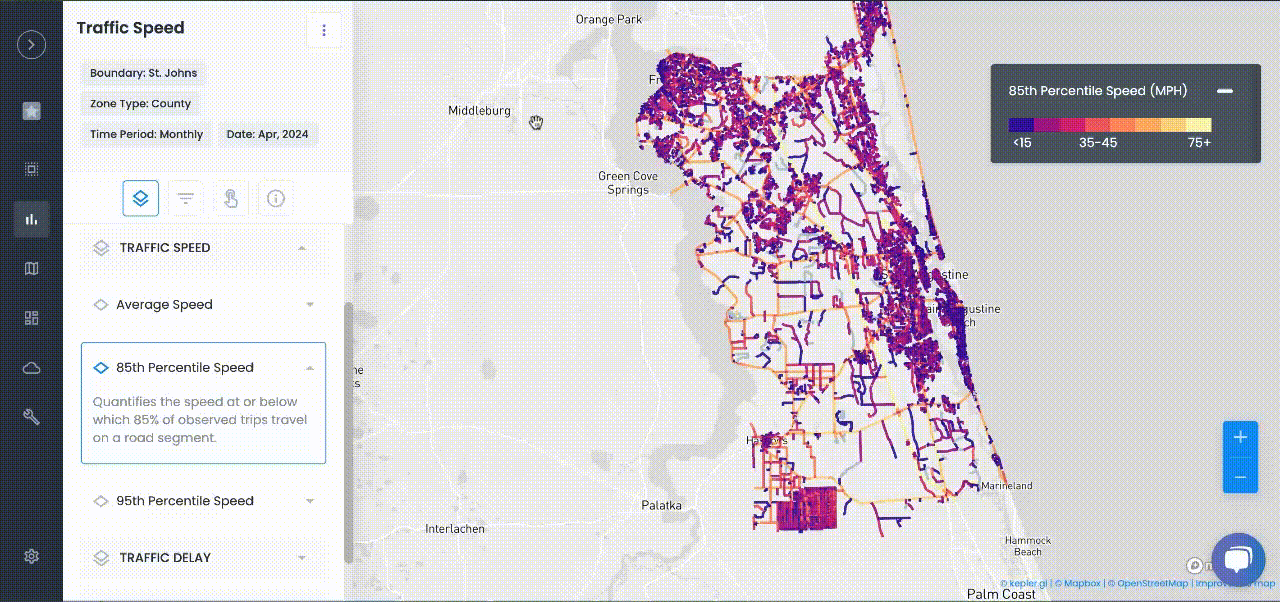
Transportation Planning
Preparing Cities for Autonomous Vehicles: Policy, Safety, and Infrastructure
Cities can prepare for self-driving cars with smarter infrastructure, traffic data, and safety analytics
Discover how cities can prepare for self-driving cars with smarter infrastructure, traffic data, and safety analytics. Learn how digital platforms like Urban SDK support road mapping, collision monitoring, and AV pilot projects.
Self-driving cars promise better safety on the roads, less traffic and smoother transportation. But for cities to really get on board with this future they need to build the digital groundwork that these cars will need. This means having smart traffic signals, good curbside management and strong platforms for tracking traffic data, road inventory and safety monitoring.
One company helping with this shift is Urban SDK, which offers advanced traffic information, road insights and safety analytics to help local governments tackle the challenges of making cities ready for self-driving cars.
Getting Infrastructure Ready: Laying the Digital Groundwork
Before self-driving cars can move around without any hiccups, cities need accurate and updated info about their roads and assets. Urban SDK helps with this by:
- Mapping Road Inventory: They use AI and satellite images to gather details like lane counts, sidewalks, bike lanes, road widths and speed limits. This replaces those slow manual surveys and gives cities real-time insight into what self-driving cars will face.
- Traffic Flow Analytics: By looking at real-time speeds congestion and travel patterns their platform shows how self-driving cars might deal with current traffic situations.
This smart use of geospatial data lets city planners see where infrastructure upgrades are needed so self-driving cars can operate safely and predictably.
Traffic Safety and Collision Data
Safety is the biggest concern when it comes to rolling out self-driving cars. Urban SDK’s Collision Index spots dangerous road sections and helps agencies figure out what changes they should make. With info on speeding traffic volumes and crash history cities can take action like calming traffic or adjusting signals before self-driving cars start hitting the streets.
By combining collision risk data with road inventory, cities get a better understanding of where self-driving cars might run into trouble and how to lower risks for everybody on the road.
Making the Planning Process Easier
Shifting to a self-driving car friendly city needs lots of ongoing analysis, reporting and community involvement. Urban SDK automates many of these tasks letting transportation agencies:
- Create reports on road performance and safety
- Keep track of traffic calming requests and citizen complaints
- Use data-driven insights to respond more efficiently
This kind of automation saves valuable time for staff so they can focus on planning ahead instead of just doing manual reporting.
Supporting Self-Driving Car Projects
Urban SDK is more than just a behind-the-scenes tool; it's already being used in projects that back the integration of self-driving cars. For instance in Jacksonville Florida the platform is helping manage road and asset data for the city's Autonomous Shuttle Corridor Project. By combining AV-related datasets with road conditions and performance data Urban SDK gives city officials the insights they need to assess and improve these pilot programs.
Even though Urban SDK does not directly regulate self-driving cars or simulate their movements it helps cities lay down the reliable data-driven foundation they’ll depend on.
The Road Ahead
Getting cities ready for self-driving cars is about more than just putting in sensors or writing new rules. It needs a strong digital layer that connects infrastructure safety data and real-time traffic insights.
Urban SDK provides just that giving cities the tools to:
- Keep accurate road inventories
- Analyze traffic and congestion patterns
- Prioritize safety measures through collision data
- Automate planning and reporting tasks
- Back up AV pilot projects with dependable infrastructure data
As self-driving car technology keeps evolving, cities that use the platform Urban SDK will be in a better spot to manage the transition making sure safety efficiency and public trust are front and center in the next era of urban mobility.
FAQs:
Q1. Why do cities need to prepare for autonomous vehicles (AVs)?
Ans: AVs promise safer roads and improved mobility, but cities must upgrade digital infrastructure, traffic management, and curbside policies to support their safe operation and maximize their benefits.
Q2. What are the critical steps cities should take first?
Ans: Start by mapping road inventory (lanes, signage, bike paths), upgrading to smart traffic signals, and developing systems for monitoring real-time traffic and safety data. Begin early stakeholder engagement across city departments and communities.
Q3. Why is public engagement important in AV rollout?
Ans: Citizen trust and input are crucial in shaping policies, addressing concerns about safety, privacy, and access, and ensuring AV adoption is equitable and accepted by the community.
Q4. What safety considerations should cities address?
Ans: Use crash history and speed analytics (like Urban SDK’s Collision Index) to pinpoint risky streets and intersections, prioritize countermeasures, and monitor improvements before and after AV introduction.
Q5. How does AV preparation affect city infrastructure?
Ans: Cities must update asset management processes to use AI and geospatial tools for real-time road audits, streamlining upgrades for traffic signals, signage, lane markings, and curb management.

TRAFFIC ENFORCEMENT FEATURES
80% of citizen complaints
are a perception problem
Urban SDK provides precise hourly speed data to evaluate complaints and deploy resources efficiently for the greatest impact to public safety.
Urban SDK provides precise hourly speed data to evaluate complaints and deploy resources efficiently for the greatest impact to public safety.
Target Speeding
Identify hot spots, validate monthly speeding trends and monitor vulnerable areas like school zones.
Improve Safety
Crash and citations location information to compare speed trends month over month
Fast Response
Respond to citizen complaints sooner with address search and exportable reporting
Deploy Assets
Generate maps for traffic enforcement by time of day, location or division to deploy officers to known problem areas.
RESOURCES
Customer Success
See how public sector leaders succeed with Urban SDK.
WEBINAR
Identify speeding and proactively enforce issues
See just how quick and easy it is to identify speeding, address complaints, and deploy officers.







